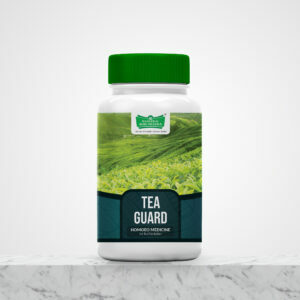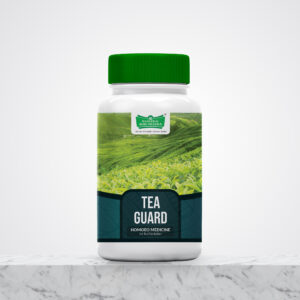Tea plants exhibit distinct morphological and physiological characteristics. Typically, they grow in a bushy manner with dense canopies of glossy, dark green leaves supported by woody stems. The lanceolate leaves are positioned alternately along the stem and range in length from 4 to 15 centimeters.
Tea plants need a humid climate with enough rainfall and do best in acidic, well-drained soils. Their rich flavor character is partly due to their strong photosynthetic rate, especially in younger leaves. Because the plants are perennial, several harvests are possible all year long. Light, temperature, and nutrients in the soil all affect their growth and development, which affects the overall quality of the tea that is produced.
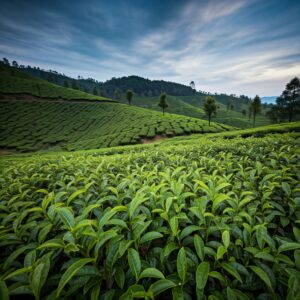
Pest and pathogens in tea plant
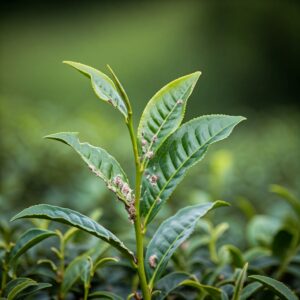 The tea mosquito bug, which feeds on tender leaves, and the leaf folder, which creases leaves, are frequent pests of tea plants. Because they spread disease and sucking sap, aphids can also be a concern.
The tea mosquito bug, which feeds on tender leaves, and the leaf folder, which creases leaves, are frequent pests of tea plants. Because they spread disease and sucking sap, aphids can also be a concern.
Pathogens include tea blight, which is caused by Cercospora fungi and causes leaf blotches, and downy mildew, which develops best in damp settings and generates grayish fungal growth. Bacterial blight, the cause of which is Pseudomonas syringae, can cause wilting and leaf drop.
Effective management involves regular monitoring, proper cultural practices, and the use of homeopathic treatments to promote plant resilience against these difficulties.
Tea Guard
Manakkal Pharma created the novel agro-homeopathic medication Tea Guard with the express purpose of strengthening tea plants’ resistance to diseases and pests. Tea Guard stimulates the plants’ innate defenses at a biochemical level by utilizing the concepts of homeopathy.
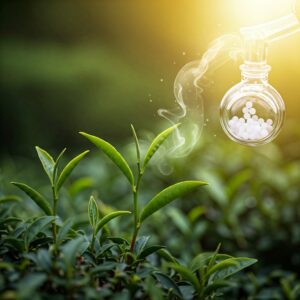 The active components of Tea Guard serve a vital function in the defense systems of tea plants by stimulating their hormones and enzymes. When sprayed, it stimulates the synthesis of antioxidants like flavonoids and phenolics, which prevent the spread of dangerous diseases and ward off pests like aphids and the tea mosquito bug. This two-pronged approach is crucial to preserving plant health and reducing harm.
The active components of Tea Guard serve a vital function in the defense systems of tea plants by stimulating their hormones and enzymes. When sprayed, it stimulates the synthesis of antioxidants like flavonoids and phenolics, which prevent the spread of dangerous diseases and ward off pests like aphids and the tea mosquito bug. This two-pronged approach is crucial to preserving plant health and reducing harm.
Additionally, Tea Guard improves phytohormone synthesis, which is essential for controlling development and stress reactions. The medication helps plants adapt more successfully to biotic stresses by raising hormone levels like jasmonic acid. This implies that tea plants are more resilient to disease pressure and pest infestations, which will eventually result in healthier foliage and higher yields.
In addition to bolstering the plants’ defenses, regular application of Tea Guard encourages a healthy soil microbiology. Nutrient intake requires healthy soil, which “Tea Guard” promotes by increasing the activity of helpful microbes that increase plant vigor in general.
Tea Guard improves the microbiological health and nutrient balance of the soil, treating it. Applying this agro-homoeopathic medication encourages the growth of fungus and bacteria that improve soil fertility by stimulating positive microbial activity. The decomposition of organic matter is aided by this enhanced microbial community, which releases vital nutrients that tea plants require for healthy growth.
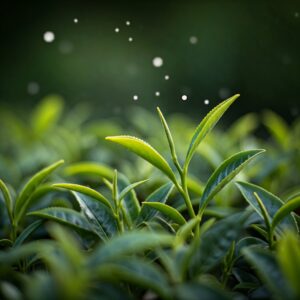 Tea Guard can also assist in bringing the pH levels of the soil back to normal, which will improve the conditions for nutrient absorption. It will guarantee that tea plants have access to the resources they require by enhancing soil structure and water retention. All things considered, “Tea Guard” promotes a more robust soil ecology, which increases plant yield and resilience.
Tea Guard can also assist in bringing the pH levels of the soil back to normal, which will improve the conditions for nutrient absorption. It will guarantee that tea plants have access to the resources they require by enhancing soil structure and water retention. All things considered, “Tea Guard” promotes a more robust soil ecology, which increases plant yield and resilience.
Tea Guard is more than just a pesticide. It’s kind of a holistic approach to sustainable agriculture. Growing tea plants with natural defenses against outside threats reduces the need for artificial pesticides and promotes environmentally friendly farming practices. This makes “Tea Guard” an essential tool for tea growers who want to enhance crop quality and yield while maintaining ecological balance.
Benefits of Tea Guard for Tea Plants
- Enhanced Growth: Regular use promotes healthy growth, improving both leaf quality and yield.
- Disease Resistance: The Tea Guard’s properties can enhance the plant’s natural defenses against common pests and diseases.
- Soil Health: Such treatments may also positively impact soil microbiology, leading to improved nutrient uptake.
Guidelines for Applying Agro-Homeopathic Medicine to Tea Plants
1. Tablet Dissolving:
50 tablets should be dissolved in three liters of water.
Method: Using a sanitized container, thoroughly mix the pills until they dissolve completely. This guarantees that the active components are distributed evenly.
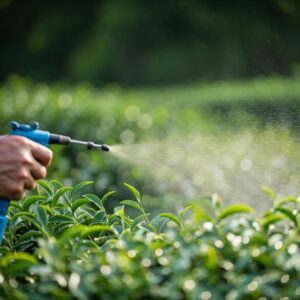 Application: After the mixture has completely dissolved, pour or mist it all around the tea plants’ bases. This focused application aids in the plants’ efficient uptake of nutrients and therapeutic qualities.
Application: After the mixture has completely dissolved, pour or mist it all around the tea plants’ bases. This focused application aids in the plants’ efficient uptake of nutrients and therapeutic qualities.
2. How Frequently It Is Used:
Time: Do the application again every two months. The steady feeding of the tea plants is ensured by this regular period, which also promotes the plants’ resilience against pests and diseases.
3.Wide-Scale Utilization:
Instructions for Mixing: For bigger regions, combine 300 liters of water with 1.5 bottles of the agro homeopathic medication.
Coverage: One acre of tea land can be sufficiently covered with this mixture. For the medication to be effective across the entire area, make sure it is thoroughly mixed.
Method of Application:
Apply evenly across the entire acre by using a backpack sprayer or a tractor-mounted sprayer. In order to optimize coverage and reduce runoff, aim for a fine mist.
When to Apply: Apply in the early morning or late afternoon when it’s cooler outside to assist minimize evaporation and improve plant absorption.
